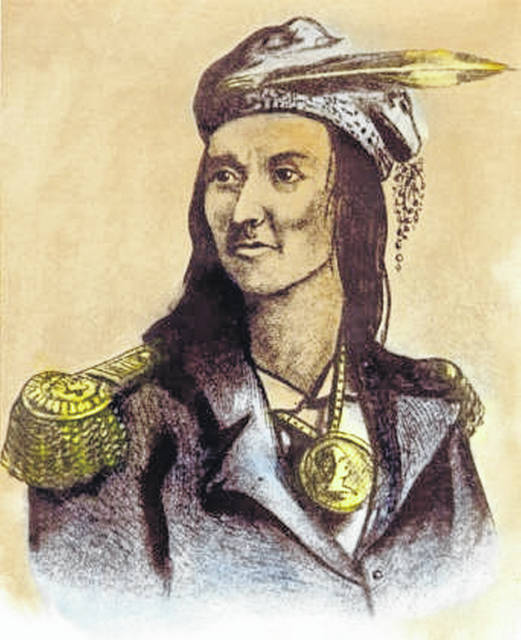

Editor’s note: in conjunction with the 200th celebration of the establishment of Shelby County, the Sidney Daily News will be publishing a year long series about the county’s history.
SIDNEY — The Shawnee Indian political leader, orator and war chief Tecumseh was born in 1768, the son of Shawnee war chief Puckshinwau and Methotaske. The place of his birth remains in dispute, with some historians claiming that he was born in Old Piqua, a Shawnee village along the Mad River. Others claim he was born in a Shawnee village along the Scioto River near Chillocothe, and still others that he was born in a Shawnee village along the Little Miami River near Xenia.
We do know that Tecumseh was but six years of age when his father was killed at the Battle of Point Pleasant (Oct. 10, 1774) during Lord Dunmore’s War. His father’s death had a lasting effect on Tecumseh. At a young age, he vowed to become a warrior like his father.
When Tecumseh was seven years of age his mother moved with a part of the tribe to Missouri in the hope of living in peace. Tecumseh would never see her again.
He was raised by Tecumapease, an older sister who trained him in the strict Shawnee code of honesty. Cheeseekau, an older brother, taught him woodcraft and hunting skills. He was subsequently adopted by the Shawnee Chief Blackfish and grew to adulthood with several white foster brothers whom Blackfish had captured during raids on the homes of settlers.
The murder and massacre of the Shawnee as well as the invasion of the Shawnee’s lands and the destruction of their crops deepened Tecumseh’s hatred of white settlers, a hatred that was first instilled in Tecumseh by his mother. During the Revolutionary War, he accompanied Blackfish in raids that included combined forces of British troops and their Indian allies against American settlers.
Tecumseh joined the American Indian Confederacy under the leadership of Mohawk Chief Joseph Brant. Chief Brant encouraged tribes to share ownership of their territory and pool their resources and manpower to defend that territory against encroaching settlers.
Tecumseh led a group of raiders that participated in a series of raids routinely attacking flatboats that were transporting white settlers down the Ohio River. These raids were extremely successful, nearly cutting off river access to the territory for a period of a couple of years.
As hostile as Tecumseh was toward white settlers, he rebuked his fellow Shawnee warriors for the cruelty that they themselves practiced. It was during one such rebuke that he first discovered that words could be powerful weapons.
After one raid, he observed the suffering a white man endured while he was tied to a stake and burned alive. Horrified, he showered his fellow tribesmen with such verbal abuse that they never again tortured a prisoner in his presence.
After the Revolutionary War Tecumseh was a member of a raiding party for a number of years, fighting small actions against the whites in the Old Northwest and assisting the Cherokees in the South. He accompanied his older brother Cheeseekau on a number of raids, and saw Cheeseekau killed September 1792 in an unsuccessful raid near Nashville, Tennessee.
Although the youngest of the marauding Shawnee group, he was named their leader. He continued to fight in small actions in the South. It was during this time that he made an acquaintance with the Creek Indians, a relationship that would help him later in forming an alliance with them.
In 1791 he further proved himself at the Battle of the Wabash as one of the warriors who defeated the American Army under General Arthur St. Clair. Tecumseh fought with Blue Jacket and Little Turtle as part of the American Indian Confederacy. They were victorious, slaying 952 of the 1,000 American soldiers in St. Clair’s army. To this day it remains the worst defeat ever suffered by an American Army. St. Clair was forced to resign from the Army, yet was allowed to remain as Governor of the Northwest Territory.
Tecumseh also fought in the Battle of Fallen Timbers (Aug. 20, 1794). This decisive conflict against General “Mad” Anthony Wayne and the Legion of the United States ended in a devastating defeat for the American Indian Confederacy and their British allies for control of the Northwest Territory.
The battle took place amid trees toppled by a tornado just north of the Maumee River in northwestern Ohio at the site of the present-day City of Maumee. The American victory resulted in the British and Indians withdrawing from the southern Great Lakes, western Ohio and northeastern Indiana following the signing of the Treaty of Greenville (Aug. 2, 1795). It was at Fallen Timbers that Tecumseh witnessed the death of still another older brother, Sauwaseekau.
Embittered by the Indian defeat at Fallen Timbers, Tecumseh encamped at Greenville but did not attend the subsequent negotiations and refused to sign the treaty. In fact, Tecumseh not only refused to recognize the treaty, he roundly attacked the “peace” chiefs who signed away land that he insisted they did not own. To Tecumseh, land was like the air and water, the common possession of all Indians. This doctrine of communal ownership of the land became the cornerstone of his message to potential allies.
A small contingency of about 250 Shawnee braves remained with Tecumseh near Greenville after the treaty was signed. In 1805, it was at Greenville that Lalawethika, one of Tecumseh’s younger brothers, experienced a series of visions. Those visions transformed Lalawethika into a prominent Shawnee religious figure.
Taking the name Tenskwataka (translated means ‘The Open Door’), the new Shawnee prophet began to preach a nativistic revitalization that seemed to offer the Indians gathered at Greenville religious delivery from the problems inflicted upon them by the whites who had invaded their territory.
Tecumseh was reluctant to accept his brother’s teachings. That changed on June 16, 1806, when Tenskwataka (referred to by both the Indians and their adversaries as The Prophet) accurately predicted an eclipse of the sun. As word of his visions spread, Indians from throughout the Midwest began moving in large numbers to Greenville. Tecumseh began to slowly transform his brother’s religious following into a new pan-Indian alliance.
In 1808, Tecumseh and The Profit moved their village to the juncture of the Tippecanoe and Wabash rivers. The new settlement, Prophetstown, continued to attract additional numbers of Indians.
In 1809, Governor of the Indiana Territory General William Henry Harrison induced several tribes of Indians to sign the Treaty of Fort Wayne. The treaty transferred 3,000,000 acres of American Indian land to the government for settlement by white settlers in Illinois and Indiana.
The negotiations excluded the Shawnee. Although they were inhabitants of the area, they had previously been asked to leave the area by Miami War Chief Little Turtle.
With inexhaustible energy, Tecumseh traveled from New York to Arkansas and Iowa to Florida in an effort to gain recruits among dissenting tribesmen for his envisioned confederacy. He was particularly successful among the tribes of the Creek Confederacy.
While he was away, General William Henry Harrison marched troops to the Wabash and encamped near Prophetstown. Although Harrison intended to negotiate, The Prophet attacked Harrison’s camp. He was so decisively defeated in the ensuing Battle of Tippecanoe (November 7, 1811) that his followers dispersed. Having lost his prestige, The Prophet fled to Canada and ceased to be a factor in Tecumseh’s future plans.
Seeing the approach of the War of 1812, Tecumseh assembled his followers and joined the British forces at Fort Malden on the Canadian side of the Detroit River. There he brought together perhaps the most formidable force ever commanded by a North American Indian, an accomplishment that was a decisive factor in the capture of Detroit (August 16, 1812) and the 2,500 U.S. soldiers stationed there.
In addition, the invaders captured 33 cannons, a large quantity of stores and equipment, a number of horses and a newly built sailing ship. As a token of appreciation, British Major General Isaac Brock slipped off his own red military sash and wrapped it about the chief’s waist. In quick response, Tecumseh removed his beaded sash and handed it over to the general.
Emboldened by victory, Tecumseh and his force joined Major General Henry Proctor in a siege of Fort Meigs. (present-day Perrysburg, Ohio). The siege began on April 28. On the morning of May 1, 1813, British artillery opened fire on the American fortification. Although the bombardment lasted five days, the Americans within the fort held on until reinforcements (1,200 Kentucky militia) arrived.
The arrival of the militia led to several engagements over a number of days. More than 600 American troops were lost to the combined force of British regulars, Canadian militia, and Native American warriors. Even so, the British and their allies gave up the siege.
In July, Tecumseh encouraged the British to attempt a second siege of the fort. Rather than an artillery barrage, the Indians hid in the surrounding forest and staged a mock battle in an attempt to convince those inside the fort that there were Americans in grave danger outside and in need of help, inducing the defenders to come outside the fort to save them. Despite the firing of muskets, war cries, and other sounds of struggle, the defenders did not fall for the ruse, but instead fortified themselves inside the fort.
The arrival of a strong thunderstorm forced the British and Native Americans to once again withdraw.
Following the failure of the second siege, the British and their allies were put on the defensive by US Naval Forces Lake Erie Commander Oliver Hazard Perry’s decisive victory over the British fleet in the Battle of Lake Erie (September 10, 1813). Subsequently, General Harrison invaded Canada.
As conditions around Detroit worsened, General Procter began a retreat east toward Niagara. Tecumseh requested arms so that his men could stay in the Northwest Territory and continue to defend their lands.
In an attempt to pacify Tecumseh, General Procter agreed to make a stand at the forks of the Thames River. However, when the combined forces reached the site communication broke down. Some troops deserted while others continued to retreat eastward toward Niagra. When the Americans attacked on Oct. 5, 1813, large groups of men broke and ran, leaving about 500 American Indians to hold back 3,000 American troops.
Tecumseh, directing most of the fighting, was killed during the course of the battle. His body was carried from the field and buried secretly in a grave that has never been discovered. Tecumseh’s death marked the end of Indian resistance in the Ohio River valley and in most of the Lower Midwest and South. Soon after, the depleted Indian tribes were forcibly removed west of the Mississippi River.



